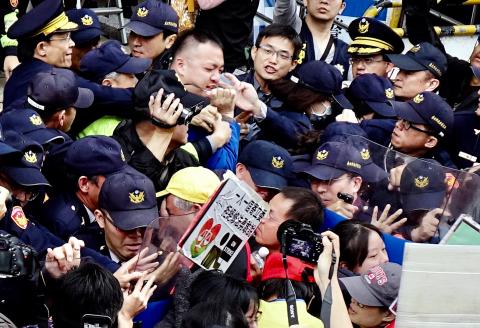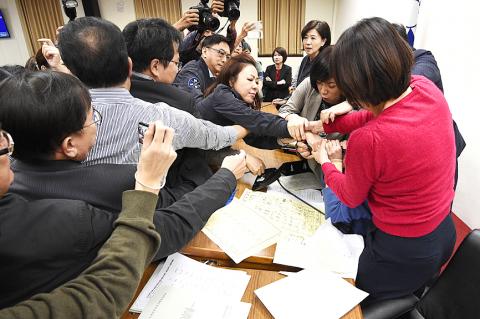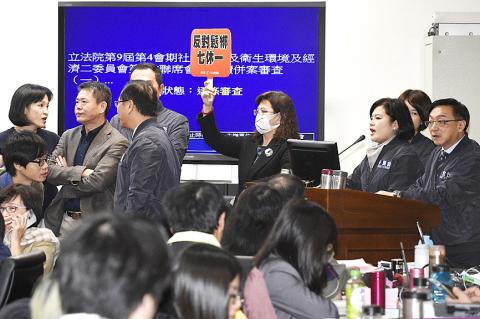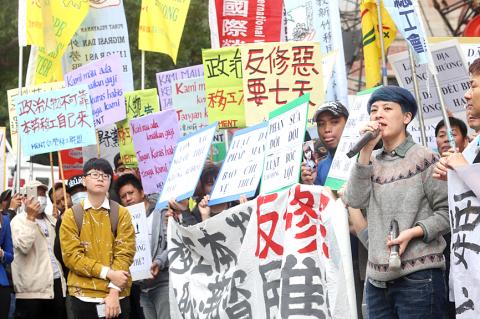Scuffles broke out among lawmakers yesterday at a meeting of the legislature’s Economics Committee and Social Welfare and Environmental Hygiene Committee, as they began reviewing proposed amendments to the Labor Standards Act (勞動基準法).
The review, which was scheduled to start at 9am, did not begin until after 11am. Later, a motion to extend the review to midnight was passed.
New Power Party (NPP) and Chinese Nationalist Party (KMT) lawmakers tried to boycott the review by disputing the time limit for each lawmaker’s speech, but dissenters were forcibly carried away from the podium by Democratic Progressive Party (DPP) members.

Photo: Chien Jung-fong, Taipei Times
DPP Legislator Lin Shu-fen (林淑芬) tendered a motion to amend articles 32, 34 and 36 of the act.
The Cabinet’s draft bill would amend Article 32 to cap an employee’s working hours at 138 hours every three months, while Lin proposed that it be changed to 138 hours for three “consecutive” months.
As for Article 34, the Cabinet’s version would require at least 11 hours of rest between shifts, which could be shortened to eight hours if employers and employees reach a consensus.

Photo: Chen Chih-chu, Taipei Times
While the Cabinet plans to loosen the “one rest day” rule by amending Article 36, Lin proposed maintaining the version that was passed in December last year.
A motion tendered by DPP Legislator Chiu Chih-wei (邱志偉) to limit each lawmaker’s speech to six minutes — four plus two — was passed with the support of DPP lawmakers.
Opposition parties continued to try to delay the review by extending their speeches as long as possible, while disputing the time limit.

Photo: Chen Chih-chu, Taipei Times
The ruling party should have stuck to its past position, NPP Legislator Kawlo Iyun Pacidal said, citing a protest in 2014 by DPP caucus whip Ker Chien-ming (柯建銘) against the three-minute time limit during a legislative review of a draft of the special regulations for free economic pilot zones (自由經濟示範區特別條例).
DPP lawmakers are replicating the political injustices that were ruled out by the nation’s voters, NPP caucus convener Hsu Yung-ming (徐永明) said.
Amid intermittent scuffles between legislators of various parties, DPP Legislator Lin Ching-yi (林靜儀), who chaired the meeting, ordered an end to discussions on articles 24 and 32, and pushed them to a cross-caucus negotiation.

Photo: CNA
Meanwhile, hundreds of people gathered outside the Legislative Yuan in Taipei to protest against the Cabinet’s draft amendment.
Barricades were on Sunday placed outside the legislative compound, while about 700 police officers were deployed to block off the area and form a human wall in front of protesters on Jinan Road.
At 11am, protesters tried to storm the compound, hurled eggs at the legislative building and scuffled with police, while clashes broke out as a result of two failed attempts to breach the police cordon.
The protest was still ongoing as of press time last night.
Additional reporting by CNA

A Ministry of Foreign Affairs official yesterday said that a delegation that visited China for an APEC meeting did not receive any kind of treatment that downgraded Taiwan’s sovereignty. Department of International Organizations Director-General Jonathan Sun (孫儉元) said that he and a group of ministry officials visited Shenzhen, China, to attend the APEC Informal Senior Officials’ Meeting last month. The trip went “smoothly and safely” for all Taiwanese delegates, as the Chinese side arranged the trip in accordance with long-standing practices, Sun said at the ministry’s weekly briefing. The Taiwanese group did not encounter any political suppression, he said. Sun made the remarks when

PREPAREDNESS: Given the difficulty of importing ammunition during wartime, the Ministry of National Defense said it would prioritize ‘coproduction’ partnerships A newly formed unit of the Marine Corps tasked with land-based security operations has recently replaced its aging, domestically produced rifles with more advanced, US-made M4A1 rifles, a source said yesterday. The unnamed source familiar with the matter said the First Security Battalion of the Marine Corps’ Air Defense and Base Guard Group has replaced its older T65K2 rifles, which have been in service since the late 1980s, with the newly received M4A1s. The source did not say exactly when the upgrade took place or how many M4A1s were issued to the battalion. The confirmation came after Chinese-language media reported

The Taiwanese passport ranked 33rd in a global listing of passports by convenience this month, rising three places from last month’s ranking, but matching its position in January last year. The Henley Passport Index, an international ranking of passports by the number of designations its holder can travel to without a visa, showed that the Taiwan passport enables holders to travel to 139 countries and territories without a visa. Singapore’s passport was ranked the most powerful with visa-free access to 192 destinations out of 227, according to the index published on Tuesday by UK-based migration investment consultancy firm Henley and Partners. Japan’s and

BROAD AGREEMENT: The two are nearing a trade deal to reduce Taiwan’s tariff to 15% and a commitment for TSMC to build five more fabs, a ‘New York Times’ report said Taiwan and the US have reached a broad consensus on a trade deal, the Executive Yuan’s Office of Trade Negotiations said yesterday, after a report said that Washington is set to reduce Taiwan’s tariff rate to 15 percent. The New York Times on Monday reported that the two nations are nearing a trade deal to reduce Taiwan’s tariff rate to 15 percent and commit Taiwan Semiconductor Manufacturing Co (TSMC, 台積電) to building at least five more facilities in the US. “The agreement, which has been under negotiation for months, is being legally scrubbed and could be announced this month,” the paper said,